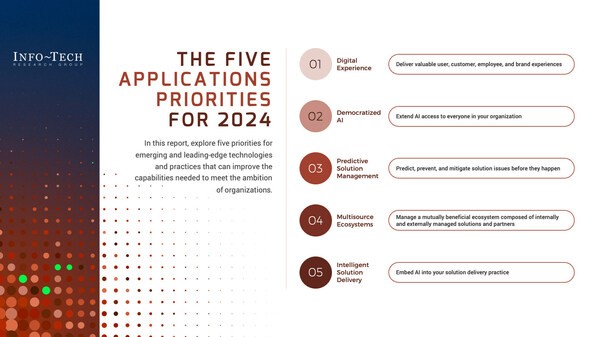 |
Info-Tech's Applications Priorities 2024 report highlights the transformative strategies APAC technology leaders will need to consider for this year, including digital experience enhancement, AI democratisation, predictive solution management, multisource ecosystem integration, and intelligent solution delivery. By embracing the global research and advisory firm's recommended priorities, organisations can better align their application strategies with evolving business goals, fostering innovation and competitive advantage in a rapidly changing digital landscape.
SYDNEY, April 23, 2024 /PRNewswire/ -- As organisations continue to navigate the complexities of the digital era, which has been marked by exponential advancements in AI and technology, the strategic deployment of modern, practical applications has become indispensable for sustaining competitive advantage and realising business goals. Info-Tech Research Group's Applications Priorities 2024 report offers a comprehensive guide for applications leaders as it outlines the adoption of emerging technologies and practices to enhance organisational capabilities in 2024 and beyond.

Info-Tech's annual report identifies five key priorities that range from delivering exceptional digital experiences to democratising AI access. The recommended priorities are set to redefine the role of applications in driving business success this year. By focusing on these areas, IT and applications leaders can ensure their application portfolios are not just current but are also driving innovation and competitive advantage in their industry.
"As CIOs and IT executives in APAC navigate the fast-evolving digital landscape, the focus should be on strategically integrating AI to enhance business operations and user experiences, democratizing AI access to foster an innovative culture, and proactively managing their multisource ecosystems," says George Khreish, Managing Partner, APAC. "By doing so, CIOs ensure their technology strategies not only align with but actively drive their business objectives, enabling them to remain competitive and responsive in a dynamic global market."
The Applications Priorities 2024 report outlines the key disruptors applications teams face that have an impact on how work is conducted, how services are delivered, and how organisations interact with their customers. From the democratisation of IT enabling more user-driven development through no-code platforms to the constraints of budgets that limit growth and innovation, the digital landscape is rapidly evolving. Info-Tech's report emphasises the importance for applications leaders and their organisations to acknowledge these disruptors and adapt to them, which can help not only mitigate risks but also create new opportunities for growth and innovation.
"Applications are critical components in any business strategic plan. They can directly influence an organisation's ability to be dynamic, flexible, and responsive to changing expectations, business conditions, and technologies," says Andrew Kum-Seun, research director at Info-Tech Research Group. "Business leaders are continuously looking for innovative ways to better position their application portfolios to satisfy their goals and objectives, which is achieved through applications priorities. Given the scope and costs involved, these priorities must be carefully crafted to clearly state achievable business outcomes that satisfy the different needs of diverse groups of customers, stakeholders, and users."
Drawing on a wealth of data and insights, the new report leverages findings from experts in the industry as well as data from Info-Tech's CEO-CIO Alignment diagnostic and CIO Business Vision diagnostic. Additional data was also gathered and analysed from Info-Tech's Tech Trends 2024 report, as well as the HR Trends Report 2024 from the firms' McLean & Company division.
The Applications Priorities 2024 report provides applications leaders with a comprehensive overview of the applications landscape. The report highlights the following five key initiatives essential for navigating the complexities of today's digital environment, driving innovation, and aligning application strategies with an organisation's overarching goals for 2024 and the coming years:
The Applications Priorities 2024 report also includes insights in the form of case studies from organisations and their clients, such as Mastercard, Bloomberg, Carousel, e-Estonia, and GitHub Copilot.
As the digital landscape continues to evolve at an exponential pace, the Applications Priorities 2024 report provides applications leaders with a guide to optimising their application portfolios and teams. By implementing the outlined priorities, leaders can ensure their application strategies are not only aligned with their organisational objectives but are designed to drive innovation and maintain a competitive edge. This approach will enable applications leaders to transform their application portfolios into dynamic assets that respond effectively to the changing demands of the business environment, fostering a culture of agility and sustained growth.
For exclusive media commentary Info-Tech's subject matter experts or to access the complete Applications Priorities 2024 report, please contact pr@infotech.com.
About Info-Tech Research Group
Info-Tech Research Group is one of the world's leading information technology research and advisory firms, proudly serving over 30,000 professionals. The company produces unbiased and highly relevant research to help CIOs and leaders make strategic, timely, and well-informed decisions. For more than 25 years, Info-Tech has partnered closely with IT teams to provide them with everything they need, from actionable tools to analyst guidance, ensuring they deliver measurable results for their organisations.
Media professionals can register for unrestricted access to research across IT, HR, and software and hundreds of industry analysts through the firm's Media Insiders program. To gain access, contact pr@infotech.com.
For information about Info-Tech Research Group or to view the latest research, visit infotech.com and connect via LinkedIn and X.